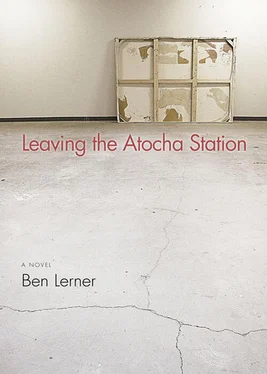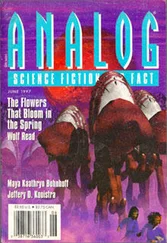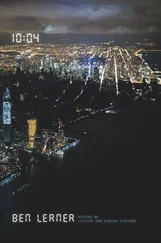“Poor boy,” Rufina said, and looked like she wanted to embrace me. The thrill I felt at her gaze checked the advancing waves of guilt. Isabel appeared in the door.
“I want to go,” she said.
“Sit down, my love,” Rufina said with an authority that returned Isabel to her chair. Then to me: “Continue.”
“I came here,” I began, “and nobody knows me. So I thought: You can be whatever you want to people. You can say you are rich or poor. You can say you are from anywhere, that you do anything. At first I felt very free, as if my life at home wasn’t real anymore.” Isabel was trying to make herself believe I’d confessed my lie to Rufina. “And I was glad to be away from my father,” I threw in for color, implying my dad, gentlest of men, was some kind of tyrant. “But then the reality returns. And I have constant terror. I call her all the time. She says she is fine, but I don’t know for sure. I didn’t want to leave her, but she said I had to come here and do my work. That I had a responsibility to my writing. She insisted. I can’t imagine life if something happens to her. And then when I meet someone important,” I said, looking directly at Isabel, “I lied. To see. If I could say even the words.” Isabel appeared to understand. “I am crazy, I know,” I said, placing my head in my hands. Then I said, looking up at Isabel again, “I am sorry. I am sorry to her. I am sorry to you.” I contemplated crying.
Isabel came to me and pulled my head against her and said something to comfort me that included the word “poet.” Rufina was rubbing my leg. I saw myself as if from the yard, amazed.
__________________________
That winter my research fell, my research was falling, into two equally unrepresentable categories. All December, there was rain, record amounts apparently; the city was strangely empty, emptied; even if it were merely drizzling, the Spaniards seemed to suspend all nonessential activity. Besides young men delivering the orange canisters of butane, or elderly women protected by plastic slickers hurrying between grocers, I saw next to no one on the streets. That December, if someone rang my buzzer, and that someone could only be Isabel, Teresa, or Arturo, their cars illegally parked in La Plaza Santa Ana, I wouldn’t answer, and because it was raining, they wouldn’t linger.
These periods of rain or periods between rains in which I was smoking and reading Tolstoy would be, I knew, impossible to narrate, and that impossibility entered the experience: the particular texture of my loneliness derived in part from my sense that I could only share it, could only describe it, as pure transition, a slow dissolve between scenes, as boredom, my project’s uneventful third phase, possessed of no intrinsic content. But this account ascribed the period a sense of directionality, however slight or slow, made it a vector between events, when in fact the period was dilated, detached, strangely self-sufficient, but that’s not really right.
During this period all like periods of my life were called forth to form a continuum, or at least a constellation, and so, far from forming the bland connective tissue between more eventful times, those times themselves became mere ligaments. Not the little lyric miracles and luminous branching injuries, but the other thing, whatever it was, was life, and was falsified by any way of talking or writing or thinking that emphasized sharply localized occurrences in time. But this was true only for the duration of one of these seemingly durationless periods; figure and ground could be reversed, and when one was in the midst of some new intensity, kiss or concussion, one was suddenly composed exclusively of such moments, burning always with this hard, gemlike flame. But such moments were equally impossible to represent precisely because they were ready-made literature, because the ease with which they could be represented entered and cancelled the experience: where life was supposed to be its most immediate, when the present managed to differentiate itself with violence, life was at its most generic, following the rules of Aristotle, and one did not make contact with the real, but performed such contact for an imagined audience.
This is what I felt, if it wasn’t what I thought, as I smoked and listened to the rain on the roof and turned the pages and smelled the wet stone smell of Madrid through the windows I kept cracked. And when I read the New York Times online, where it was always the deadliest day since the invasion began, I wondered if the incommensurability of language and experience was new, if my experience of my experience issued from a damaged life of pornography and privilege, if there were happy ages when the starry sky was the map of all possible paths, or if this division of experience into what could not be named and what could not be lived just was experience, for all people for all time. Either way, I promised myself, I would never write a novel.
When it was raining in the afternoon I would sometimes walk through El Retiro, which would be empty save for a few hash dealers, all African, passing the time under the awning of a shuttered kiosk or, if it was only drizzling, standing under one of the steaming trees. There were always hash dealers in El Retiro, most of them around my age, selling eggs of what they called “chocolate,” mainly to tourists, as there was much better hash to be had. I was surprised by how polite the polyglot dealers were, the prices highly negotiable in whatever language, no threat, however vague, of violence, and their sheer numbers startled me: one for every fifty yards of the park in good weather. While they must have known each other, one sensed that each man worked alone. As far as I could tell, the police tolerated the dealers in the park, although I’m sure they could be, and occasionally were, rounded up and deported. The police tolerated hash in general; I could never quite tell if it was legal or illegal to smoke. A policeman or park official of some sort might pass by on a golf cart, see you conversing with one of the dealers, and shoot you a dirty look, but never, in my experience, would he stop; if the look were dirty enough, the dealer might walk away from you, but typically with more annoyance than concern.
In the rainy period of my research, I would buy an egg or half an egg from whatever dealer I first encountered, the dealer surprised to have a customer in such weather, then walk to the semicircular colonnade built around the statue of Alfonso XII overlooking El Estanque. When I found a relatively dry, sheltered place, I smoked and watched the faint rain fall into the artificial lake. I had never smoked hash before coming to Spain and, unlike the weed I smoked in Providence, which instantly made me an idiot, the hash usually allowed me to maintain, or at least to believe I was maintaining, the semblance of lucidity, especially after months of habituation. I experienced it as a tuning of the world, not, as with strong weed, its total transformation or obliteration, and I could read or “work” while smoking hash, or at least believed I could, whereas when smoking stronger stuff I could not follow, let alone form, whole sentences. But the alterations effected by the hash were somehow all the more profound for being understated, in part because one could forget or at least discount the role of the drug in one’s experience. If, say, a group of trees that had previously been mere background suddenly stood forth a little and their slender and strictly symmetrical forms became an elegant if unparaphrasable claim about form in general, you could write that observation down without dissolving it in the process, or without the strangeness of your hands distracting you from however you’d planned to use them. If a slight acoustic heightening allowed you to perceive for the first time consciously that the sound of the leaves in the wind was, as it were, in conversation with the similar but ultimately distinct sound of distant traffic on Calle de Alfonso XII, or that a hammering noise was in fact two noises, one issuing from a nearby tree and the other from a construction site beyond the park, and if these realizations inspired some meditation on the passing into one another of the natural and the cultural, the meditation, if not profound, could at least achieve coherence, could be formulated as it was experienced, not retrospectively, after coming down. Many people, I believed, used similar drugs to remove themselves from their experience, but because, for as long as I could remember, I always already felt removed from my experience, I took the drug to intensify the vantage from said remove, and so experienced it as an intensification of presence, but only at my customary distance from myself; maybe, when I panicked, that distance was collapsing.
Читать дальше












